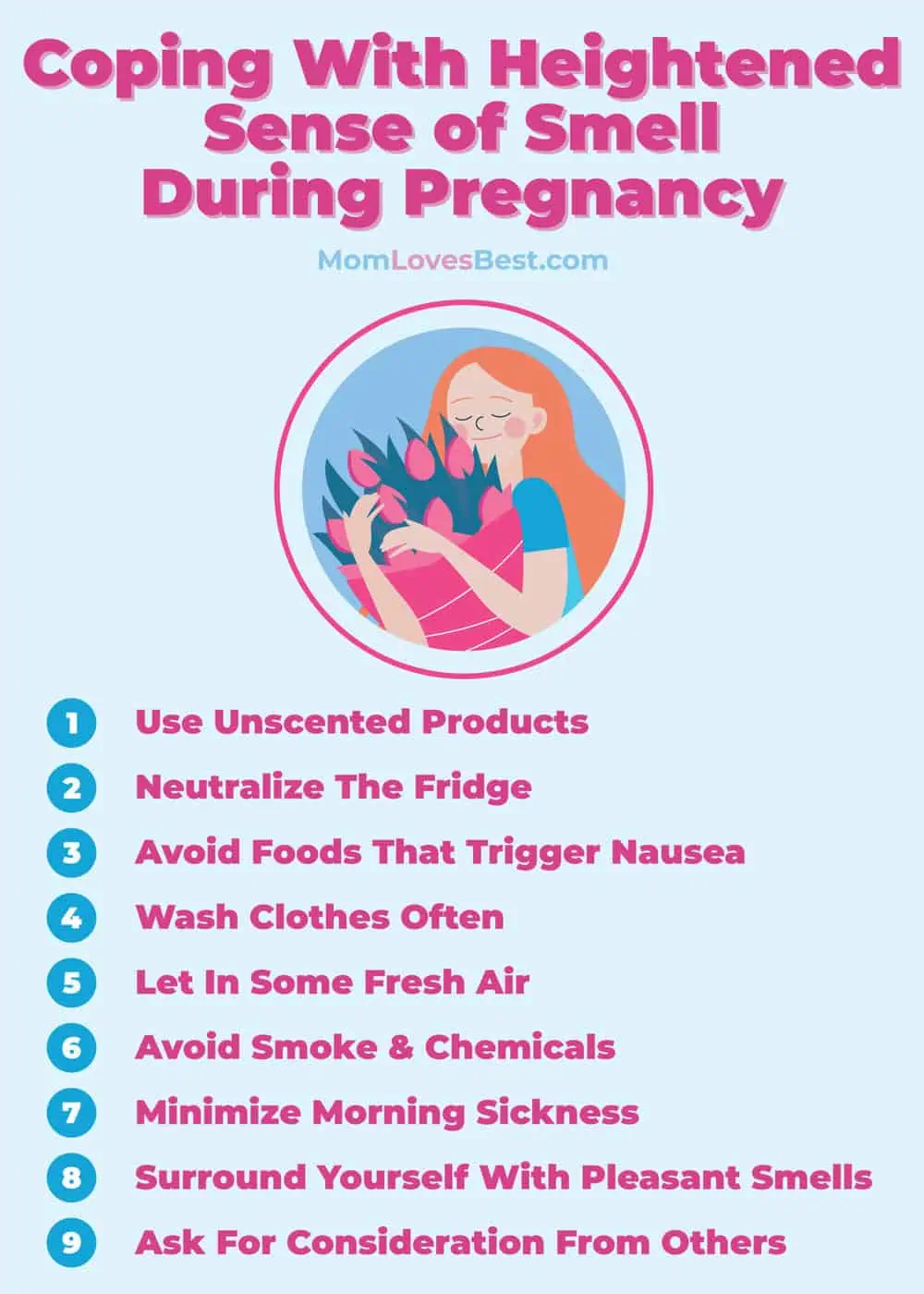Are you pregnant and finding that every little smell makes you queasy?
The body goes through some wacky changes during pregnancy, and the nose is no exception. Your sense of smell is suddenly amplified once you’re expecting.
Let’s talk about what causes your heightened sense of smell during pregnancy, when this phenomenon begins and ends, and what you can do to cope with those unbearable smells.
Key Takeaways
- Heightened sense of smell, or hyperosmia, is common in pregnancy, especially during the first trimester.
- Hormonal changes, such as increased estrogen and HCG levels, may cause this heightened sense and contribute to morning sickness.
- Coping strategies include using unscented products, avoiding triggering foods, and surrounding yourself with pleasant smells.
- The heightened sense of smell typically fades in the second trimester as pregnancy hormones stabilize.
When Does Your Sense of Smell Start to Heighten?
Most women notice an amplified sense of smell during their first trimester (1). This is known as hyperosmia and can often be one of the very early signs of pregnancy.
Even the slightest odor can suddenly become overpowering. Certain smells you once despised may now seem quite delightful, while others you had loved may now make your stomach turn. You might even find your partner’s scent repulsive — or possibly more attractive.
It’s important to remember that not all pregnancies are the same, and your sense of smell can be different in your first and every other pregnancy. If you are pregnant and you’re not experiencing the heightened sense of smell, it doesn’t mean that you won’t become a “superhero sniffer” in your subsequent pregnancies.
Editor's Note:
Dr. Irena Ilic, MDSmells That Trigger This Sensitivity
The sensitivity level varies among each pregnant woman. Some women may only notice a slight to moderate increase in sensitivity, while for others, it can be pretty intense.
The odors you’re sensitive to may vary from woman to woman. Some women might find the smell of cottage cheese and soap repulsive, while others might not be able to be near broccoli, milk, or even their regular perfume.
However, there are a few common smells that seem to have many pregnant women running to the toilet:
- Meat and fish.
- Garlic and onions.
- Fried foods.
- Eggs.
- Coffee.
- Alcohol.
- Cigarettes.
- Gasoline
- Musty, damp, and moldy smells.
- Animals.
- Hand sanitizer.
You’ll quickly find your super-sensitive pregnancy nose taking charge of your diet and your surroundings.
Causes of Heightened Sense of Smell During Pregnancy
When I first noticed my heightened sense of smell, I felt like a superhero. Could something have happened to me that finally triggered some of the superhuman powers I had always wanted? Unfortunately, that wasn’t the answer.
So what is it about pregnancy that gives you this super sense of smell?
Research is still unclear, but there are a few theories:
1. Hormonal changes associated with morning sickness
You can blame those crazy pregnancy hormones once again! The rising levels of estrogen and HCG (human chorionic gonadotropin) hormones during the first trimester can cause nausea and vomiting. If you’re already nauseous, a strong odor is likely to exacerbate it (2).
Hyperosmia is also associated with hyperemesis gravidarum (3).
Fluctuations in your HCG levels correlate very closely with the changes in your sense of smell and the intensity of nausea and vomiting. This hormone is probably responsible for the changes in your odor likes and dislikes. For example — if morning coffee was your pick-me-up ritual, and now that you are pregnant, you can’t stand the smell of your favorite beverage — you can blame the HCG.
A heightened sense of smell is so closely associated with morning sickness that researchers have even found that women born without a sense of smell don’t suffer from morning sickness at all (4). Crazy, huh?
2. Protective mechanism
Your bionic sense of smell may even be a protective mechanism to keep you away from toxins and potentially dangerous substances which could possibly harm your growing baby. The heightened sense of smell occurs about the time when your baby is most sensitive to these harmful substances, which is early in the pregnancy.
Some researchers suggest that your hyper-awareness of odors may arise from the fact that once pregnant, you are more aware of possible health risks associated with odors, and your brain is hyperreactive when it comes to smell. That’s why the smell of cigarettes and alcohol might especially bother you, even if it didn’t before your pregnancy.
What can happen late in the pregnancy is opposite to this “bionic sense” — a woman’s sense of smell may decrease. The reason behind this is straightforward: tissue in your nose becomes more swollen, leaving less space for airflow, and that reduces your ability to register different smells. This is when many pregnant women complain of a “stuffy” nose.
Editor's Note:
Dr. Irena Ilic, MDTips for Coping With This Bionic Sense
Unfortunately, there’s nothing you can do to prevent a heightened sense of smell, but there are some things you can do to help cope with those overpowering odors:
- Use unscented toiletries and cleaning products: Switch out your strong-smelling deodorant soap and shampoo with unscented versions. Avoid harsh chemical smells and stick to natural and fragrance-free cleaning products. If you are feeling overheated and you are careful about choosing personal care products during pregnancy, there are fragrance-free deodorants you can use if you are sensitive to smells.
- Neutralize your fridge: Rid your fridge of obnoxious smells by cleaning it out often. Store an open box of baking soda on the shelf to help neutralize odors.
- Eat smart: Avoid cooking and eating foods you can’t stand to smell and those that trigger nausea. You might have to switch out those scrambled eggs you were eating for breakfast with a yogurt parfait. You might even need to ask your partner to do the cooking for a while.
- Wash clothes often: Odors like to cling to fibers on your clothes and bedding and linger, so be sure to wash them often with gentle, unscented detergent.
- Let in some fresh air: Open your windows to air out musty and unwanted smells. Also, go outside to get some fresh air as much as you can.
- Avoid smoke and chemicals: You should always try to avoid smoke and chemicals while expecting. This is an excellent opportunity to ask your family members that you love so much to quit smoking or at least avoid smoking in your presence and your family home. If the smell of smoke is lingering on a person close to you, don’t be afraid to walk away or kindly ask them to wash their hands. If your work involves using chemicals, be sure to ask your boss for other assignments you could do instead.
- Minimize morning sickness: Try to keep your morning sickness under control by eating small frequent meals, taking B vitamins, drinking peppermint tea, sucking on ginger candies, and eating potatoes.
- Have a safety net: Take along a “safety” smell for those times you need to deter your nose from an unpleasant odor. For example, you could carry some lip balm or lotion you know you’re still fond of.
- Surround yourself with pleasant smells: Experiment to find out which smells you now find appealing. Even though many moms say that mint, lavender, and ginger were soothing during their pregnancies, be sure to explore other herbs, flowers, citrus, baked goods, and surround yourself with the scents you love.
- Ask for consideration: Don’t be afraid to ask your partner and coworkers to lighten up on the perfume and tuna fish. You might feel uncomfortable about suddenly not appreciating your partner’s body odor, but make sure you discuss it openly with them and remember that this is just a phase. I’m sure they’ll be understanding of your new bionic sense.
When Do The Smell Aversions Go Away?
Don’t worry; your super sense of smell won’t stick around forever. Sometimes it sticks around until after you deliver, but most of the time, it recedes early in the second trimester once your pregnancy hormones start to settle down. Some women are even lucky enough for it to last just a few short weeks in the first trimester.
Until then, hold your nose! Steer clear of offensive odors, and embrace the pleasant ones.
The Nose Knows
If you’re suddenly gagging over the scent of your favorite food, it might be a sign that you are expecting.
We don’t know why pregnancy gives us this superhuman sense of smell. However, some experts believe it might be because of the rise in hormones associated with morning sickness or possibly even due to a protective mechanism to avoid pathogens that could harm your baby.
This pregnancy superpower typically dies down in the second trimester, but until then, do your best to cope with the smells.
Avoid using scented toiletries, detergents, and cleaning products. Wash your clothes often, open some windows, neutralize your fridge, and surround yourself with pleasant smells. Make the most of this phenomenon and visit a garden or a bakery!








